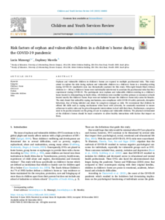Orphans and vulnerable children in children’s homes are exposed to multiple psychosocial risks. This study aimed to explore the risks facing orphans and vulnerable children in a children’s home in a township setting during COVID-19. Fifty-eight female Black African children (n = 58) in a children’s home were individually interviewed to ascertain the psychosocial risks that they experienced during COVID-19. The participants were orphans and vulnerable children residing in a children’s home located in Johannesburg in South Africa. All children were enrolled in either primary or secondary schools located nearby the children’s home. Boys were not included because the children’s home only caters for females.
The study found that unhealthy coping mechanisms, non-compliance with COVID-19 safety protocols, disruptive behaviour, fear of being infected and abuse by caregivers emerged as risks. The authors recommend that children be offered life skills such as coping mechanisms when faced with adversity, be constantly monitored to ensure adherence to safety rules and be given therapeutic interventions to deal with their fears. Furthermore, caregivers need to be psycho-educated on the giving of care to orphans and vulnerable children. The physical environment of the children’s homes should be made conducive to allow healthy interactions with factors that impact on them.

